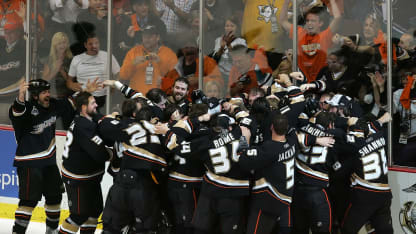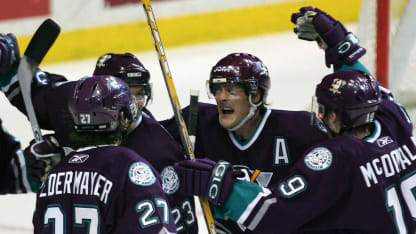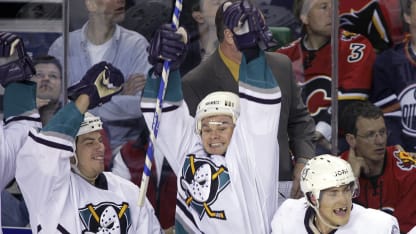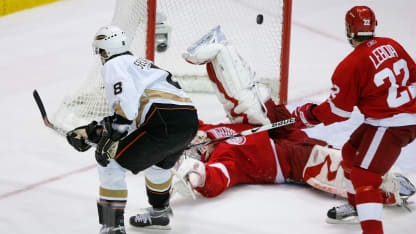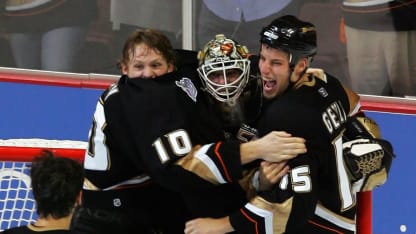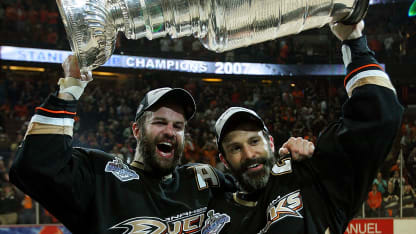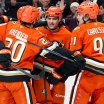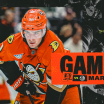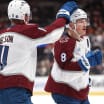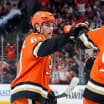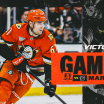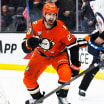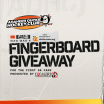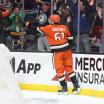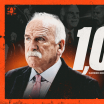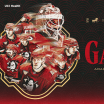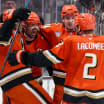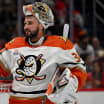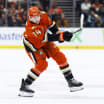Marchant: That team really felt like it had unfinished business in a sense that we felt we deserved better.
Murray: Quite frankly, we got beat by Edmonton because of Pronger and Roloson, two guys who ended up working for us [Roloson would become Anaheim’s goaltending coach after retirement]. But we felt like we should have beaten them that series.
Hayward: I thought at the time we had a great team here in Anaheim. We were right on the cusp of being the dominant team in the league. What stands out for me, is that we lost to the Edmonton Oilers in a conference final series in which I think we outplayed the Oilers in every single game by a significant margin. And I just remember at the end of it, that it was like, "I can't believe we lost the series." Dwayne Roloson was an absolute superstar and Chris Pronger showed why, at the time, he was, if not the best, certainly one of the top two, or three defensemen in the NHL. He was a dominant player in that series as well. So I just remember that it was a very deflating feeling, watching that Stanley Cup Final. It just was setting up so well if we got past Edmonton, we would've faced Carolina in the final, and I really would've liked our chances in that series. And it was one of those reminders, I guess, that you never know what can happen in the Stanley Cup Playoffs, because, not only should we not have lost in five games, we should not have lost that series.
Scott Niedermayer: We felt good at that point with ourselves, with everybody that was involved with the team, with what the Samuelis were trying to do, the support they showed us. Brian, the coaching staff, Randy, everybody. We had accomplished some things the year before but we knew there was still more work to be done. People were still pushing forward and giving us everything we needed to do that. So we were excited. We were just real excited to get going again to get back out there and have some fun playing hockey and trying to win a Stanley Cup.
For the second straight summer, the Ducks would make some moves that had a tremendous impact on the organization. On June 22, 2006 the team officially changed its name from the Mighty Ducks of Anaheim to the Anaheim Ducks in a festive ceremony at the Arrowhead Pond (which would become Honda Center four months later). The franchise also unveiled a new “Ducks” wordmark logo and color scheme of black, gold and orange (a tribute to the team’s Orange County home) with new uniforms modeled by Perry and Marchant.
Perry: I think the Samuelis wanted to put their mark on the franchise, and really show that they care about this team and they're going to establish its own identity. Moving forward I think everybody was excited about the new change. And the fans were excited. The players were excited to see what kind of jerseys we were going to have.
Marchant: I think Henry and Susan wanted to put their own stamp on this team. They had just taken over the team the year before, and you kind of just let things ride out. The way that they wanted to do that, was first off get rid of the Mighty part, and second of all change the color of the jerseys. I know that a lot of effort, and a lot of things went in to that whole process. I was fortunate enough, Corey Perry and I, came out for the unveiling, and we had not seen the jerseys until we actually put them on. I remember him and me both looking at each other and going, "Wow." It looked traditional. It looked crisp. They chose black because they thought black was a color that made you look tougher. I think that sort of image carried over into the way that we played. We were a hard team to play against, and if you had asked anybody that season that they knew they were going up against the Anaheim Ducks, they knew they were in for a tough night. I think that all was part of the whole process of being able to turn the corner on what was a great franchise prior to them taking over, but then to carry the tradition to another level.
Ryan Getzlaf, Ducks center: It was great. The jersey change, the name change, all those things were pointing in the direction of their taking control and wanting to do something here.
Selanne: It was what we were expecting because obviously when the Samueli family took the team over, they wanted to have their own identity in the end. We heard the rumor that the "Mighty" was going to drop off the name, and that's fine. And I really liked the new uniforms and everything. And obviously when Disney was the owner, even they were good owners too, but you really didn't feel that soul in the organization because it was big company behind it. But now it was a family and you felt that soul, and as much as the Samueli family does for the communities here, it was a different feeling.
Giguere: I was glad we kept the name Ducks. I was glad that we kind of kept a tie to what we were. But in the same time, I think it was time for a change. I think the new colors and the new name fit the team well, fit our personality well. The colors match well with Orange County. It was a well-needed change. I like the old logo, and the colors, and all that, but this definitely felt more modern and more fresh.
Within days of announcing a new identity, the Ducks added a major piece to its roster in a blockbuster trade with the Oilers that brought Pronger to Anaheim in exchange for right wing Joffrey Lupul, defenseman Ladislav Smid and three draft picks.
Murray: When Burkie sets his mind to things, he gets it done. And that’s what he did with the Pronger trade. We were fighting over the last [conditional] first round pick because I thought we’d given them enough. But he said, “We’re gonna do this.” Thank God he was right, because you don’t win the Cup without two No. 1s on defense, which we had with Pronger and Niedermayer. Once we made that deal, we knew we had a pretty solid team.
Niedermayer: We knew we had a real good team after what we did the year before, and really believed and were excited about being able to chase the Stanley Cup. And then when you get a little shot in the arm by acquiring a defenseman like Chris, such a great player, smart player, fierce competitor, I think our confidence just got a big boost when everybody heard that. Rightly so.
Chris Pronger, Ducks defenseman: Having just played them in the conference final and knowing the roster fairly well and the style they play, I was excited to be a part of that team and that group. I certainly thought we had a chance to do what we did, which was compete for a Stanley Cup. And of course there was the weather, the lifestyle, my brother [Sean] had played there and was still living there. So it was high on my list on a number of fronts, but first and foremost the hockey team.
Getzlaf: When you go out and we lose in the conference final the year before, we knew we were missing something, obviously. To go out and make a statement like going and getting Chris Pronger at the start of the year, that just showed all of us in the locker room, I think, that they're willing to spend. They're willing to do whatever it takes to win, and they did it.
Selanne: I knew it was going to help us next year because we had a really good team and obviously that offseason, we got Chris Pronger. When I heard that news my smile was pretty big. I knew right away that he was the missing piece of what we didn't have here before. When we got him, I really felt that this team had a chance to win the whole thing.
Pronger: I knew most of the guys from a distance, and obviously from playing against them, but didn’t know them personally. You play against players and you battle, and most recently we had battled one another pretty hard, going through the verbal jabs and whatnot. Having played Teemu fairly hard for let’s call it 13 years, I think he was excited to be able to play with me, and I was excited to play with him. I thought my skillset matched up with his speed and being able to outlet the puck to him for breakaways appealed to me and I think him as well.
Marchant: When they made the trade for Chris Pronger, that turned everything around for us. I think it started in training camp, where we looked around and thought, We were close last year, but this is a team that could win it all. I can't think of any team in the last 15 years or so that has had two No. 1 defensemen like we did in Pronger and Scott Niedermayer. They could play against anybody and in any situation, and it was apparent that would be a difference-maker right away. What also helped is having a close group of guys. We'd go out for dinner on the road and there'd be 13 or 14 guys there. We felt like we were destined to do something great.
Anaheim was picked by many to win the Cup that year and the Ducks wasted no time showing they had become the class of the league. They set an NHL record by earning points in their first 16 regular season games (a 12-0-4 record).
Murray: Early on that year, I remember distinctly there was one game where we beat them walking away, like 5 or 6 to nothing. And I remember thinking, This team is as good as we think it is. That team was special.
Marchant: The biggest thing with that team was that we expected to win, every single night. There are certain buildings that are tough to play in. When you have a team that maybe isn't as strong, or isn't as talented, you kind of go into some of those buildings saying, "Geez, I hope we can squeak out a win tonight," or, "I hope that we can get a point," or whatever. That wasn't the case with that team. That team, it didn't matter who we were playing, and when we were playing, where we were playing, we expected to get two points every night. And that was the mentality of that team, and that's why that team was so successful. We played a pretty brash style of hockey and didn't back down from any situation. That was our identity as a team and we stuck to it and played to it every night.
Pronger: We had guys that understood how we needed to play. We had the ability to score goals, but we had the ability to play the power game, a heavy a game, a tough game. I think we could play any way you wanted. We could play a tight defensive game or we could beat you 6-5. We could play a speed game or a punch in the face game. We were a jack of all trades but at a high level. We could beat you a lot of different ways, and that was the exciting thing about it. That was the appeal of that team for me, and Randy’s system was tailor made for that group of players.
Giguere: That team was special from the get go. I don't think there was a doubt in anyone's mind that that's where we were heading. I think when you can have guys like Scott Niedermayer and Chris Pronger on your team, either playing together or separately, it makes your team so much stronger. It makes you an elite team right off the bat. We had very talented forwards who could score some goals and on top of it, we were one of the toughest teams in the league. Nobody wanted to play us. Everyone else did their job and made it easy on me. But it was a good team, well-coached and well-prepared. We never really had a doubt we were heading for something great.
Randy Carlyle, Ducks coach: I don't know if you could say there was a defining moment. I think our group made the decision at training camp. The way our team came together right out the gate of training camp, we got together and we were a team early. And I think we had some sort of crazy record going. We were unbeaten and we hadn't lost in like [16 games] or something and it just seemed that that was a stepping stone. And then we ran into a little bit of a hurdle at Christmas, but we found ways to regroup. And we made adjustments as we went forward, but players are the ones that put it on the line night in night out and they deserve all the credit.
Andy McDonald, Ducks forward: Whether it was on the scoresheet or a defenseman making a great play, blocking a shot, there was always some guy in the spotlight. It made it really tough to defend against us because it was like, “Well, who do you stop?”
Murray: You remember the old dynasty teams like Montreal and the Islanders and Edmonton, some of those Boston teams I grew up watching. Those teams could play the game any way you wanted. You want to play fast? Okay. You want to play physical? Okay. Any way you want to throw it tonight. That was the thing with our team, they could go any way you wanted it to go. I have too much respect for those old teams to make comparisons, but the only thing I’ll say there is I wish there was the opportunity to see our team play some of those great ones. I think our team could have played with them.
Marchant: That team had so many veteran guys like me who had been in the league for years and never won a Cup. So we were a hungry group, and we knew that opportunity doesn't come around every day. You don't know when you'll get back here, so you want to take advantage of it now.
Pronger: We had high expectations and then to get off to that type of start, you’re clicking on all cylinders. At some point, you’re gonna hit some adversity, and I think the big thing for us was how we’re gonna deal with it. It hit when Scotty and I got hurt, and we fell into a bit of a funk. That was our little wakeup call, where we lost probably five of eight or six of ten, and it was a little slap in the face that we can’t just show up. We’ve got to come prepared to work and play our style and our system to the best of its ability. As the season goes on, the teams that succeed continue to adhere to the little details and push themselves to get better. When you face some tough challenges, you understand your team better and the dynamic of each player, and you can overcome those things.
Scott Niedermayer: I think there are moments where you recognize that it could be a special team. You're in the dressing room and there is a feeling, there is an atmosphere in there, and you recognize that everybody is buying in. Everybody is committed to what we're trying to do here, and we're doing it real well. When that happens, you know your chances of having success are good. In the middle of those things, you never want to admit it and you never want to let your guard down. But obviously now as time's passed and looking back at it, I think most guys would agree in a sense that we had the special feeling that it takes to have success. Guys were willing to put the work in, sacrifice themselves for whatever they needed to do for the team. You can sense it, but you don't want to admit it at the time. You want it to keep going.
Selanne: We had a great combination of older guys and younger guys, Getzlaf and Perry were up and coming. Our top line with [Chris] Kunitz and [Andy] McDonald was unbelievable and really solid. Defense, we had Pronger and Niedermayer and Beauchemin and [Sean] O'Donnell and those guys, very solid. And we have the checking line of [Samuel] Pahlsson, [Travis] Moen and [Rob] Niedermayer, and that line was our best line a lot of nights. Great goalies in Jiggy and Bryz who gave us confidence and chance to win every night. So the depth that we had was unbelievable, and that made a big difference. That’s what made this team so special. There were no egos. Everyone had a role, and we all accepted it. There was so much hard work.
Scott Niedermayer: You look at the makeup of that team, some of the older players we had who brought a lot of that experience and different experience to the team, and then the younger group of players who brought their enthusiasm and talent and played huge roles. You have that combination of things, and obviously goaltending with Jiggy and Bryz - both of them very capable of doing the job for us. Yeah, I think that team can be put up against any other team that's won the Stanley Cup and argue that they're as good as any of them.
Among the more valuable members of the team, though certainly not the most heralded, were the checking line of center Samuel Pahlsson and wingers Rob Niedermayer and Travis Moen. The line stayed intact for virtually the entire season and through the playoffs, frequently assigned to shut down the opponents’ top units while contributing on the offensive end as well.
Getzlaf: Those guys were huge. They were the unsung heroes. They played so many hard minutes for us and against a lot of other top lines. Those guys a lot of nights would play 20 minutes a night, and check against the best lines and the best players in the league. On top of that, they scored some big goals for us throughout the playoffs. Most of them, or the three of them, played so well together, and I think it started the year before when they learned each other and learned what they were gonna do. And then they went out and every night came out and did the same things, and they blocked shots and they hit. They made it tough on other lines.
Perry: They definitely were our workhorses that whole year and in the playoffs. They shut down the top line of the other team, they killed penalties for us, and they put up some big numbers, and they scored some crucial goals at crucial times, and those three guys were our best line by far in keeping guys off the score sheet.
Giguere: You can’t say enough about those guys.
Travis Moen, Ducks winger: Me, Robbie and Sammy, we just clicked. We just went out and worked hard every night. Didn’t care who got credit for goals and our role was defensive. We tried to play well defensively every night. If we chipped in, we chipped in.
Rob Niedermayer: I think the biggest thing our line had was trust. That was the key word for us. If I’m gonna be in a certain position, they’re gonna be backing me up, and the same goes for them.
Newell Brown, assistant coach: We called Sammy Pahlsson the Viking, because nothing could stop him.
Pronger: They were so good because all three of them can skate well, all three of them are physical, and eventually all three are going to get scoring opportunities because of that.
Marchant: For a line to be successful, you have to develop a good chemistry, and that showed because they were together all year. It was the only line that was together all year long.
The Ducks made a couple of in-season moves that brought in two eventual fan favorites. George Parros was acquired from Colorado for draft picks and soon became immensely popular for his fighting ability, personality and signature mustache. The Ducks made only one significant move at the trade deadline, as veteran Brad May was also brought in via a trade with Colorado and added a veteran presence, toughness and charisma.
George Parros, Ducks enforcer: They were off to a real hot start that year at the time of the trade. And, I was put on waivers by LA to start the season and picked up by Colorado, then traded to Anaheim. So, in a matter of a month and a half, I'd gone from being on the waiver wire, to joining the frontrunners for the Cup that year. So, it was quite an amazing period of time, and I was certainly excited to come back to California.
Brad May, Ducks winger: When I was traded, I was so lucky and fortunate to be traded to this team. It was amazing. No matter what team you are traded to, you try and do the best you can. But coming to such a great team – and I was the only one who was picked up that day – you just didn’t want to screw it up. You just kind of find your place. I knew a lot of the guys, and I was very comfortable with Brian Burke and that group. It just worked out perfectly.
Murray: We had known Brad and knew he was high character. We were tough enough as it was, but we wanted that little extra character guy. We had some injuries and this was some depth we needed. We didn’t do very much, but we didn’t need to do very much. The moves we made that season were tinkering with the depth of the hockey club.
Anaheim captured its first Pacific Division championship on the last day of the regular season to earn a No. 2 seed in the Stanley Cup Playoffs. They dispatched the Minnesota Wild in five games in the opening round, winning the first three straight without its veteran goalie J.S. Giguere. The former Conn Smythe winner was tending to his newborn son Maxim, who was born with a condition in his right eye known as persistent fetal vasculature syndrome (he ultimately had successful surgery to repair it). Backup Ilya Bryzgalov performed admirably in the first three games of the Minnesota series, but Giguere made his first appearance midway through Game 4 and started every game the rest of the postseason.
Giguere: Throughout the whole playoff there was an issue with my son's eye condition. And when there was time that the doctor thought he may have cancer, and stuff like that. Emotionally, it was very difficult. I can't explain to you how difficult all this was.
Murray: Jiggy and his wife handled it so professionally. He’s a special guy. We wanted to give him as much time as he needed. He’s the ultimately professional, and he didn’t want to disrupt the hockey team. It couldn’t have been easy for him. The good thing was that we he had Bryz as a backup, and he had won a bunch of playoff games the year before. He’s a different character, but he can stop the puck.
Carlyle: We had a decision to make that we thought would be in the best interest of the hockey club, because his mind wouldn’t where it needed to be, and you can’t blame the individual. There are things that happen in life that are more important than the game, and this was one of those things.
Brian Burke, then Ducks General Manager: I’m not sure I’ve seen a guy focus through adversity like J.S. Giguere did here. To have a baby with a serious medical issue and refocus and play like he did, I’ve never seen anything like it.
Pronger: Especially when it’s your first child, not really knowing what’s to be expected, and you hear the various things I’m sure he heard from the doctor, it can rattle you. He’s an emotional guy and someone who needs to feel a certain way to play the game. To his credit, he went to Randy and Burkie and said it was affecting him and he couldn’t play. We as players appreciated that and certainly understood and wanted him to be comfortable. At some point he was gonna get the opportunity, and ultimately when he did, he took the bull by the horns and got back to Playoff Jiggy form. The rest is history.
Marchant: Jiggy was great for us all year long. So was Bryzgalov. We had a great tandem in the two of them. You're not gonna advance in the playoffs if you don't get great goaltending, and certainly Jiggy did that from the time that he got into the playoffs till the end when we won. It just goes to show you that he had been there before and he knew what he had to do.
With Giguere in net, the Ducks took a 3-1 series lead on the Vancouver Canucks and their star goalie Roberto Luongo in the Western Conference Semifinals.
Selanne: Every series is a different story, and you never know how the teams are gonna match against each other. And Vancouver, we knew they had a good team and scoring power with the Sedin brothers [Daniel and Henrik] and everything. But the confidence we had that year, it was just so special.
The deciding Game 5 at Honda Center went to double overtime before Rob Niedermayer laid a jarring hit on Vancouver’s Jannik Hansen and knocked the puck loose. Scott Niedermayer picked it up and immediately fired it past a distracted Luongo, who was pleading to officials for a penalty.
Scott Niedermayer: It was a crazy play obviously. A puck coming up the boards and my brother stepping in and getting a big hit. The puck just kind of slid to me. I think people were a little bit distracted by the big hit wondering, Was it a penalty or what's going to happen here? I just quickly whipped the puck at the net, because usually that's just a good play. Get the puck on the net and good things can happen. I was as surprised as anybody when it went in, no doubt. I've been around enough to know strange things do happen. You gotta be on your toes every second you're on the ice. It’s just one of those strange moments where we came out on the right side of it, and it was pretty exciting to see it happen.
Rob Niedermayer: I just stepped into him and the puck bounced right to Scott. We were throwing everything at Luongo and found a way to get one by him. I couldn’t have written a better script myself.
Giguere: It was like, “What just happened?” Robbie hit him pretty hard in the corner. I think it was a pretty good check, which I could see Roberto complaining to the referee, putting his hand up and yelling at the referee, and at that point the puck goes to Scotty, and there it is, he just shoots the puck. These things happen to a player like that, because he's so good. It was just a great moment, nobody expected the goal. I've talked to Roberto since, and he was like, "Ah, I don't know what I was doing." What a great moment, what a great way to finish a game.
Getzlaf: It was one of those weird plays. I felt bad for Luongo at the end of it. He was trying to make a penalty call because of the hit by Robbie, and Scotty just threw it at the net and it found a way in. That's the way it goes when you win in the playoffs. You score in all different ways. Guys like Scotty make a name for themselves.
Todd Marchant was a veteran leader who missed the first two rounds with a sport hernia injury, but was able to contribute in other ways. He created a series of motivational t-shirts that the players wore throughout the playoffs. Each one was black and displayed inspirational words, with a new word added each round of the postseason.
Marchant: It all kind of started with Teemu, because he used to use the word "Passion" all the time. He always said you've got to play the game and live your life with passion. So I had shirts made with that word on it and I put it in everyone's stalls prior to Game 1 of the first round. The guys wore them, and in the second round they said we needed to do something different. I thought, What if we just added a word? At that time of the year, when you're in the playoffs, it's about sacrificing your body, your family having to sacrifice for the time you're away and everyone in the organization having to sacrifice for the greater good of the team. So I added that word, and it started to build steam. When we got to the third round, guys couldn't wait for the next one. I talked to some of them to see what they thought the next word should be, and someone said, "This game is all about heart. You've got to have the heart to get by this next series." Once that unfolded, I knew what the fourth word was gonna be, but I kept it to myself. There was so much excitement around the group when we won that Conference Final against Detroit and got ready for the Stanley Cup Final, and there was anticipation of what the next t-shirt was going to be. We added the one word I had in mind, so the shirt read, "Destiny is Heart, Sacrifice and Passion."
The Ducks had their toughest test of that postseason with a frequent playoff rival – the Detroit Red Wings – in the Western Conference Final.
Scott Niedermayer: You’re playing the Detroit Red Wings, a team that's been in the top of the league for quite a while. Great playoff team who knew what it took to win, and we knew it was going to be a huge challenge to have to go and try to beat them in this series. It's talented players, guys who knew how to win in the playoffs. It was going to take everything we had to try and do it, which I think proved to be the case. We had a lot of great performances from a lot of guys that played extremely well for us.
The Ducks were thrashed 5-0 in Game 3 of that series and endured another loss when Pronger was suspended for a late-game hit against the glass on Detroit’s Tomas Holmstrom. Without one of their best defensemen and leaders, the Ducks gutted out a 5-3 victory in Game 4 at home.
Giguere: We knew that to replace Prongs, not one guy could just do it on his own. We knew we had to be better as a group to replace him.
Getzlaf: We didn't match up that great against that team throughout the season. We had all kinds of battles, and had been on the losing side of a couple of them, and we knew we were in for one. To have that critical moment where our best defenseman, essentially, aside from Scotty, was out of the game, and we weren't going to be able to have him in our lineup, it was an opportunity for some other guys to step in and do some things. Our team rallied around each other. Those are those moments that help win those championships.
With Anaheim trailing 3-2 in the series and down 1-0 in Game 5 in Detroit, things looked bleak again. But Scott Niedermayer managed to score the tying goal with 48 seconds remaining and the Anaheim net empty, with a shot that deflected off the stick of Red Wings defenseman Nicklas Lidstrom and fluttered over the shoulder of goalie Dominik Hasek. Its competition for biggest goal in Ducks franchise history came later in overtime when Teemu Selanne jumped on a turnover by Detroit defenseman Andreas Lilja in the Detroit zone and roofed a backhand to win it 2-1.
Scott Niedermayer: I don't remember anything specific that was said at a moment like that, a real important moment in the playoffs. But, just having been around, knowing that one shot away can make the big difference. If that's the case, I've seen it happen for us, I've seen it happen against us, where there's such a fine line with winning and losing when you get to that position in the playoffs. You're two very good hockey teams competing really hard, and you just never stop believing, never quit, never give up, because it can happen at any moment. It just takes a split second and the game is changed. We just talked probably about that, believe in each other, trying to just get that one more shot to make a difference.

